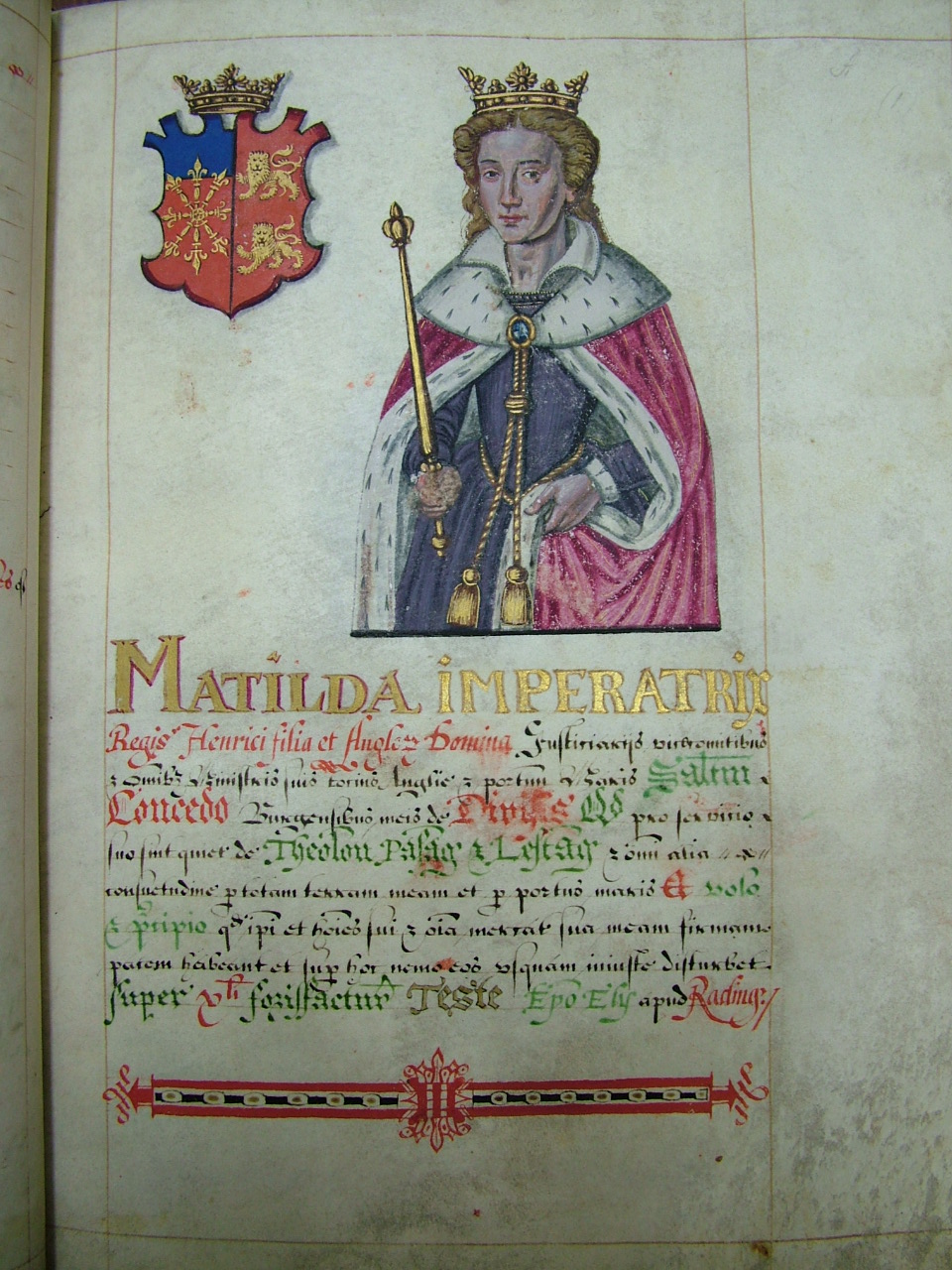For Local History month, volunteer Sasha has taken a look into the complex history of Empress Matilda, who had an important role in Devizes' history ...
"Perhaps a lesser-known civil war, the Anarchy (1135-1153), was a dispute between two grandchildren of William the Conqueror: The Empress Matilda and Stephen of Blois. The 18 years of conflict was caused by the two nobles’ belief that they were both next in line for the throne."
Matilda and Stephen
Matilda was the daughter of King Henry I of England and, after the death of her brother, Prince William, in the ‘White Ship Disaster’; she became her father’s only legitimate child and his heir to the throne. Her first marriage to Henry V of the Holy Roman Empire gained her the title ‘Empress’, which is one she used even after her husband’s death and in her next marriage.
Stephen was born in Blois, France and at the age of 10, was sent to his uncle, Henry I’s court, upon where he established himself as one of the king’s favourites, earning himself riches and lands. Stephen married Matilda of Boulogne, who was the sister of Henry I’s wife, and she proved to be a formidable asset in terms of both finances and leadership during the Anarchy.
In December 1135, Henry I died. Despite his courts swearing to recognise Matilda as their ruler, it was instead her cousin, Stephen of Blois, who ascended to the throne with the support of the English barons behind him. Matilda and Geoffrey had been in Normandy at the time of Henry’s death and, unable to travel to England, had taken the opportunity to seize multiple Norman castles with the support of the rebels they had allied themselves with; whereas Stephen had been in Boulogne and was able to easily amass his military household and travel to England.
Enter Earl of Gloucester
Despite the Anarchy being a battle between Stephen and Matilda, the war itself is quite often thought to have been started by the Earl of Gloucester, Robert, a half-brother of the Empress Matilda and an illegitimate son of Henry I. In 1138, Robert renounced his fealty to Stephen, sparking a major rebellion in Kent, as well as across the south-west of England, despite Robert himself remaining in Normandy. Geoffrey also reinvaded Normandy, whilst David of Scotland invaded the north of England, pushing south into Yorkshire, in support of his niece’s (Empress Matilda) claim to the throne. Stephen responded to all of the various revolts and rebellions, focusing more so on England than on the attacks in Normandy.
Matilda fights back
Only a year later in 1139, Matilda and Geoffrey’s invasion seemed imminent. In August the war began in earnest. With Matilda looking to be the victor.
Stephen was soon captured. Meanwhile, Matilda was taking the necessary steps to have herself crowned as queen: getting the agreement of the church and planning her coronation at Westminster. Stephen’s brother Henry made a deal with Matilda: he would grant her permission from the church to become queen, so long as she allowed him control of church business in England.
Following this, Matilda was handed the treasury and any of Stephen’s loyal supporters were excommunicated.
Prior to her coronation, the nobles and clergy gathered again, to declare Empress Matilda “Lady of England and Normandy”; however, apart from her followers, few others bothered to attend: a delegation from London were particularly obvious in their avoidance of the event.
London rebels...
Matilda’s coronation was set for June of 1141; however, the citizens of London were trepidatious about welcoming the Empress and Stephen’s forces surrounded the city. Any worries about the Empress’ safety were well placed, as on the 24th of June, shortly before her coronation was to take place, the city rose up against Matilda and Geoffrey de Mandeville, forcing them into a frenzied retreat back to Oxford, only just managing to escape in time.
While Empress Matilda was experiencing a major setback in England, her husband, Geoffrey of Anjou was simultaneously reinvading Normandy. The combination of Stephen’s weakened position in England and Geoffrey’s newfound power in Normandy began to influence the loyalty of many Anglo-Norman barons. Many began to leave Stephen’s faction, and the Empress’ lands and support steadily began to grow, allowing her to restore some of her previously ousted followers to their lands and grant new ones to other loyal allies.
Matilda and Devizes
At some point following Stephen’s release but before the Siege of Oxford, Matilda was captured at Devizes Castle-her stronghold for 6 years of the war-yet managed to escape.
Her escape plan was something other women and probably also men of the time would have balked at: she snuck out of the castle disguised as a corpse. Dressed in grave clothes and tied with ropes onto a bier, she was carried as a corpse to the safety of Gloucester (a distance of nearly 60 miles now).
Devizes Castle’s importance to Empress Matilda was duly rewarded: in 1141, following her recapture of the castle, the town was awarded its borough status and a charter which gave the people the right to hold markets in the town. The charter itself is currently on display in the Museum.
Stalemate
Between the years of 1143 and 1146, the two opposing sides reached something of a stalemate in England. Geoffrey of Anjou had consolidated his power in Normandy and was named the Duke of Normandy after his successful invasion of Rouen in 1144.
By 1147, the war was entering its final stages. Historian Frank Barlow describes the conflict in the late 1140s by simply stating “the civil war was over”, barring a few minor skirmishes and outbreaks of fights. Robert of Gloucester died peacefully in 1147, and the following year, the Empress defused an argument with the church by returning to Normandy, ending the debate over the ownership of Devizes Castle. This in itself greatly reduced the tempo of the war.
The Second Crusade was announced in also in 1147, and many of both the Empress’ and the King’s supporters joined the campaign, leaving the region for several years. Many barons were making individual peace agreements as well, ensuring that their lands and assets were secured.
Matilda's son
Matilda and Geoffrey’s son, Henry, launched a mercenary invasion of England that was unsuccessful, mainly because Henry lacked the funds to pay his men.
Matilda remained in Normandy for the remainder of the war, having seemingly given up on her plans of ruling herself, and instead was putting all of her effort into cementing and promoting her son Henry’s own claim to the throne. Henry already had gained a reputation for being an energetic, well-respected and capable leader-he had generated the power and prestige that the Empress Matilda had failed to do.
Henry invaded England a second time at the start of 1153, with significantly more success on this occasion. Besieging Stephen and forcing him to retreat to London after the agreement of a temporary truce, Henry now controlled the south-west, the Midlands and most of the north of England.
After this event, Stephen and Henry spoke privately about a potential end to the war.
Victorious Henry
Fighting continued after these talks, but Stephen was under immense pressure from his brother, Henry of Blois and Archbishop Theobald of Canterbury to broker a permanent peace between the two sides. In November, Stephen announced the Treaty of Winchester in Winchester Cathedral: he would recognise Henry as his adopted son and successor, in return for Henry doing homage to him. Stephen promised to listen to Henry’s advice but retained all his royal powers.
The treaty was sealed with a kiss of peace between Stephen and Henry in the cathedral.
Stephen died on 25th October 1154, during a trip to Dover to meet the Count of Flanders; it is now believed that he was aware of his impending death and had travelled in order to settle his family affairs.
Henry was crowned on 8th December 1154, alongside his wife Eleanor at Westminster, and began to rebuild England in his image as the legitimate heir of Henry I.
Matilda's Legacy
Despite Empress Matilda herself being unable to rule England as the rightful heir, Henry often relied on her for advice and help during the early years of his reign. She spent the remainder of her life in Normandy, where she was Henry’s representative and presided over the government of the Duchy.
Matilda died on 10th September 1167 and was buried under the high alter at the abbey of Bec-Hellouin. Her tomb bears the epitaph “Great by birth, greater by marriage, greatest in her offspring: here lies Matilda, the daughter, wife, and mother of Henry”, a phrase that became famous among her contemporaries.
Her body was disturbed multiple times over the centuries that followed but was reburied at Rouen Cathedral in 1846 and remains there still today.


